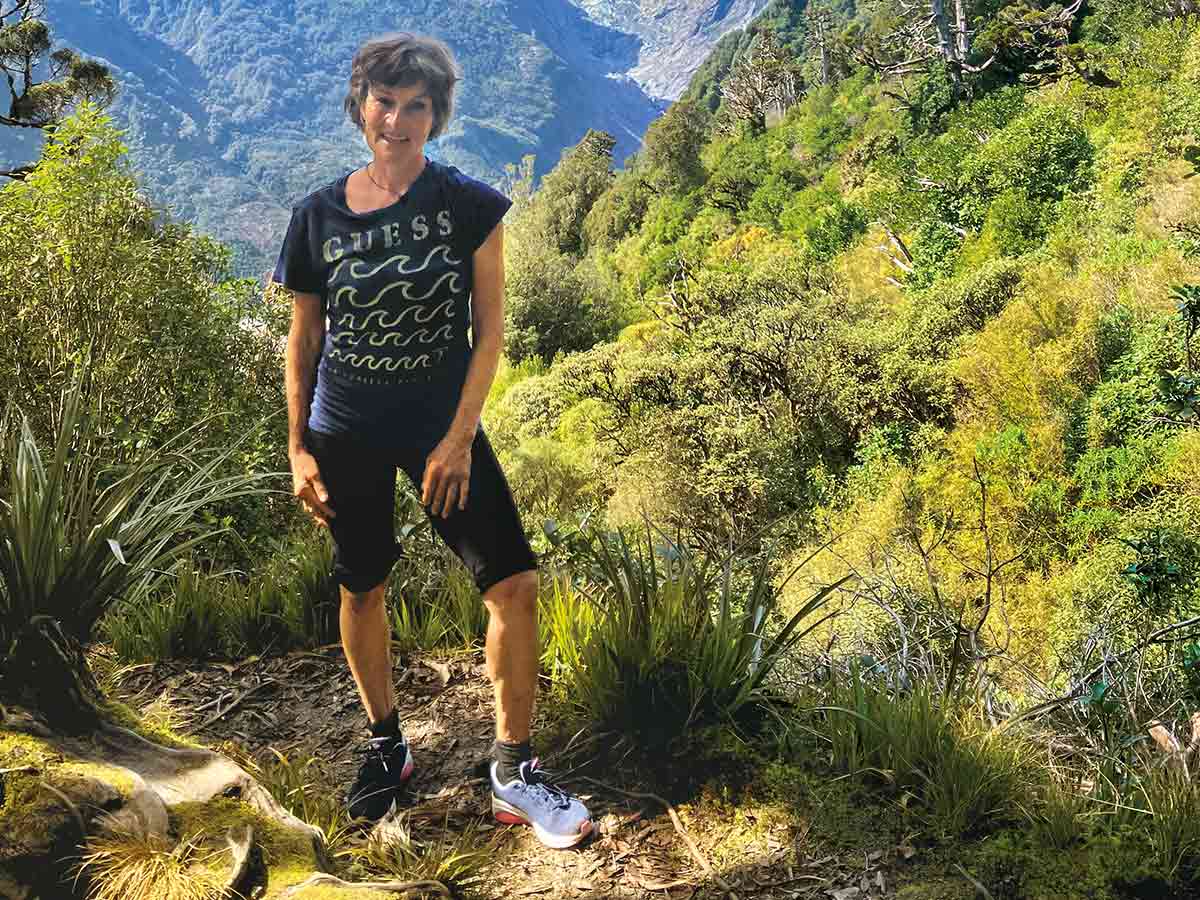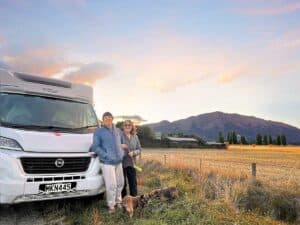For Julja Vogt, food gathering is one of the most exciting aspects of her roaming life. Jill Malcolm discovers the exquisite art of combining ingredient foraging with motorhoming – and the delicious results.
On a damp, blustery, Canterbury day, my husband Bill and I were settling our motorhome into its space in the NZMCA Park in Kaiapoi, grateful that we were coming to rest after
a long day of hard driving.
Next to us, a woman was executing a similar manoeuvre but was unaware that her motorhome’s rather large back end was making a beeline for the bicycle she’d parked to one side of her site. Five seconds before a calamity, Bill leapt from our cab and shouted her to a halt.
A bit later, I was peeling potatoes, when our vivacious neighbour knocked on the door and pressed upon us a jar of homemade, wild-orange marmalade. She said it was by way of thanks for saving her from an expensive mishap. And so, I met Julja Vogt, a food lover, cook, and forager, who has been on the road for the past three years.
“The wild oranges came from Whangārei Heads,” she says. “I was on a bike ride and came across this unkempt orange tree dripping with malformed but very tasty fruit.”
For Julja, part of the joy of travelling is foraging for produce, in the wild or at farmers markets and roadside stalls.
“Food gathering builds up memories of people and places,” she says. “I have many special foraging memories and among them is the night I spent in Duntroon. It rained overnight and the next morning the campground field was dotted with beautiful mushrooms. I can still visualise them.
“Another was a walk near Oamaru and coming across a thicket of ripe blackberries. I picked a basinful with a woman from Jamaica and her little boy. We had a lot of fun chatting as we plucked the juicy fruit and later, I made blackberry and apple tart.
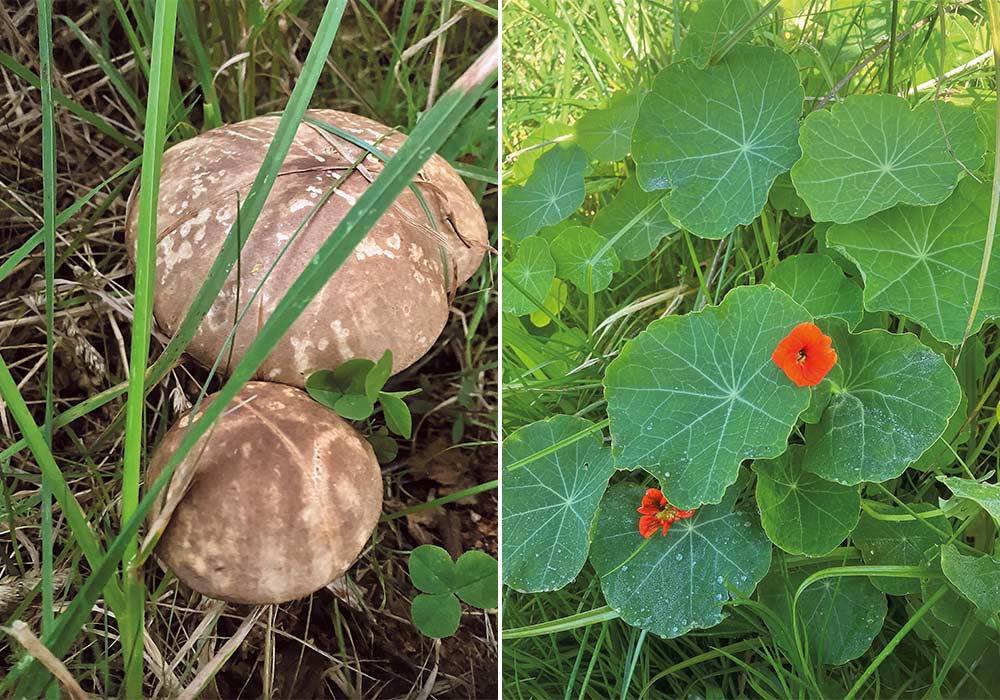
Right: Foraged nasturtiums make a tasty garnish
“In Kaikōura, carpets of wild silverbeet grow on the shingle beach close to the historic whaling cottage of Fyffe house, most likely descended from the time of the early occupants in the 1800s.
“Another time, while house-sitting in Blenheim and out walking the dogs, I sought shelter from a heavy rain shower under a large tree. I thought large drips were falling from the branches before I realised the tree was raining walnuts – a gift from above. Then, on the rocky slopes of Lake Dunstan, I discovered wild thyme among the plants crouching close to the ground. Their fragrance brought back the memory of the French bouquet garni called Herbs de Provence. When I found the other four herbs this comprises, I tied them in bundles and filled the motorhome with a little bit of France. Mixed with wild mushrooms and rice, they also made a delicious risotto.”
Julja’s favourite herb is sweet basil but when it’s out of season, she uses nasturtium, which grows anywhere. The sliced, soft leaves are a wonderful garnish, she told me, and the first bright orange blossoms are tasty in a spring salad.
Near the Kaiapoi campground where we met, Julja came across the communal Food Forest, where anyone can forage or find produce that locals leave when they have a surplus.
“This sort of thing happens quite a few places around the country,” she said. “Some ask for nothing in return; others have an honesty box for koha or payment.
“Of course, I can’t live off the land entirely. I buy staples from supermarkets but prefer markets and roadside stalls where fresh produce is straight from the soil or homemade and I can chat to producers and growers. I love experimenting with unexpected treasures, such as the plump tamarillos I found at a roadside stall near Blenheim. They looked almost too beautiful to cook but ended up as tamarillo and lime jam that I could share with others.
“Like art and music, food and cooking are part of a universal language, acting as a bridge between people and cultures. On the road, sharing food is a way of connecting. At communal happy hours in summer, people gather with their chairs and drinks and bring plates of nibbles, which are symbols of camaraderie. If people have more than they need of anything they’ll hand it on.
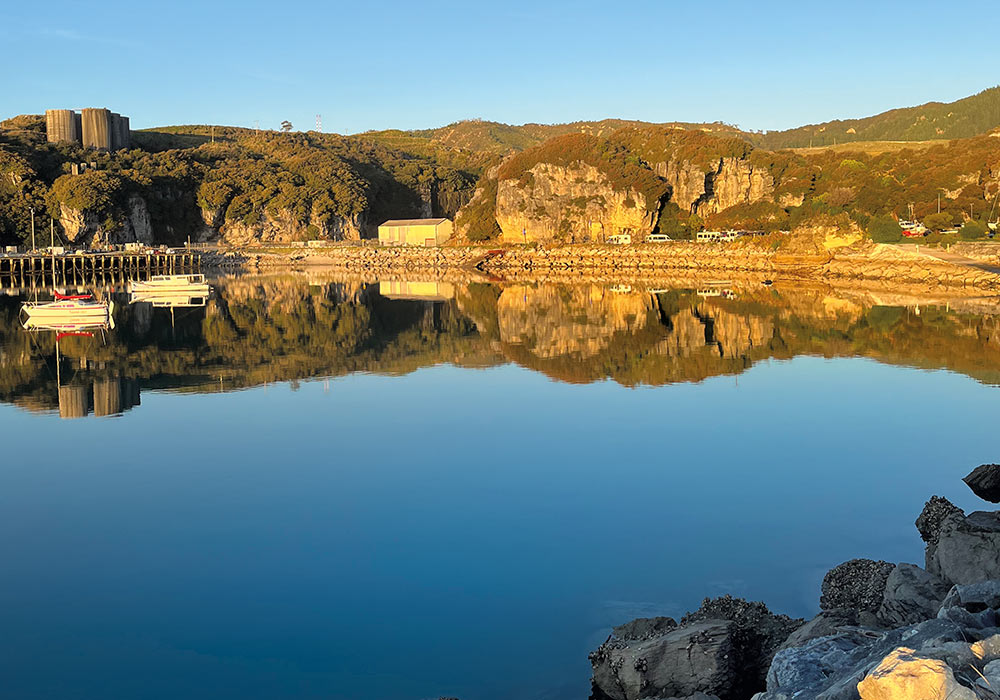
“I share my preserves and jams,” says Julja, “and the wheel always turns. The other day, an artist living in the campground I was in brought me a paper bag filled with delicious date and orange scones with a hint of nutmeg. He’d bought these delights after he’d sold one of his paintings and wanted to share them. Another time, in Hawke’s Bay, when I was a seasonal worker harvesting blueberries, I met a couple who were working in the apple packing factory. One evening, when I was exhausted from the day’s labour, they handed me an apple pie they had made in their RV.”
Jujia Vogt’s love of food stemmed from her earlier life in Europe when she worked in five-star hotels as a pastry chef. Twenty-eight years ago, with her husband, Andreas, who was also a chef, and their two children, she left Germany and immigrated to New Zealand. They worked at Château Tongariro before moving to the South Island, where their third child was born, and they started a wholesale business specialising in organic baking. Juljia created the recipes, and they baked seven days a week to supply 60 shops throughout the country.
“But our marriage didn’t get the attention it deserved,” she said, “and it ended in an amicable divorce. Years later, when our children had flown the nest, I found work in the Mapua Leisure Park as a gardener and the camp café barista. In this supportive community, I lived in a caravan, and as I interacted with the RV tourists and owners, an idea took hold. This was something I could do. I’d always wanted to travel around New Zealand but had never had the time, until now.”
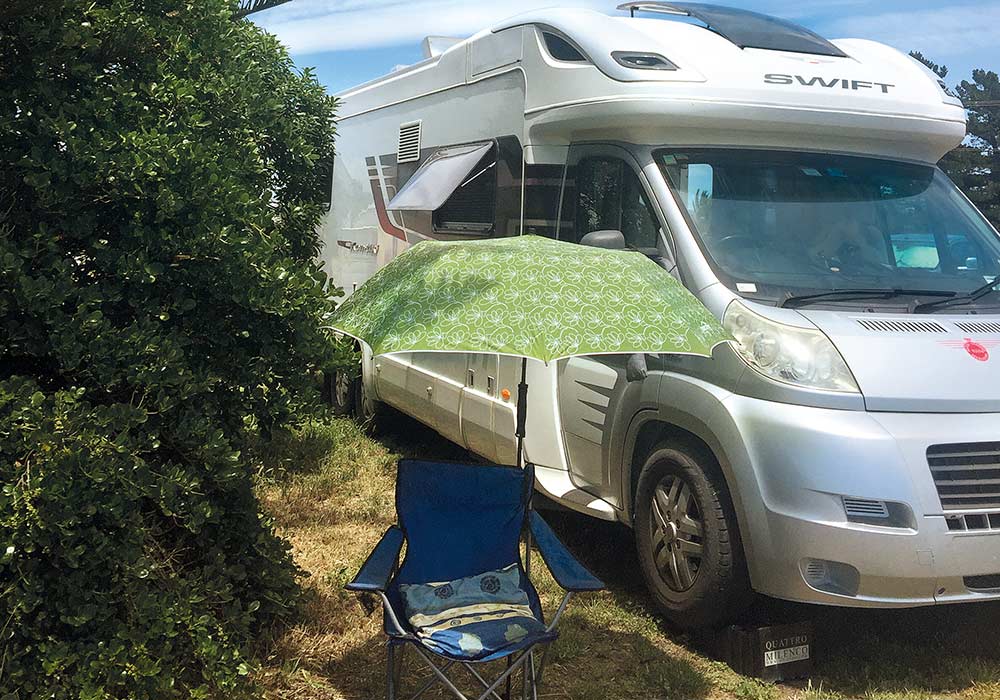
One Sunday morning in November 2019, Julja went to the Tahunanui RV Show, merely out of curiosity. She came home a few hours later, as the owner of a nine-metre, Swift Kon-Tiki motorhome.
“I’d stepped into that motorhome and a clear voice inside my head said: ‘That’s the one’. It was a pretty expensive impulse buy but I have no regrets. So far, it’s been all fun with no problems. It has a permanent bed at the rear, a spacious kitchen with a full oven, and a good-sized fridge. The bathroom and shower are separate, and the lounge is roomy. Both cab seats swivel to add seating.
“Cooking in a motorhome has made me more creative because bench space and storage are diminished and there’s less water, power, and, often, time. Even so, finding produce and ingredients, experimenting, cooking, and sharing the results are a big part of my life on the road.”
Julja’s cooking gadgets
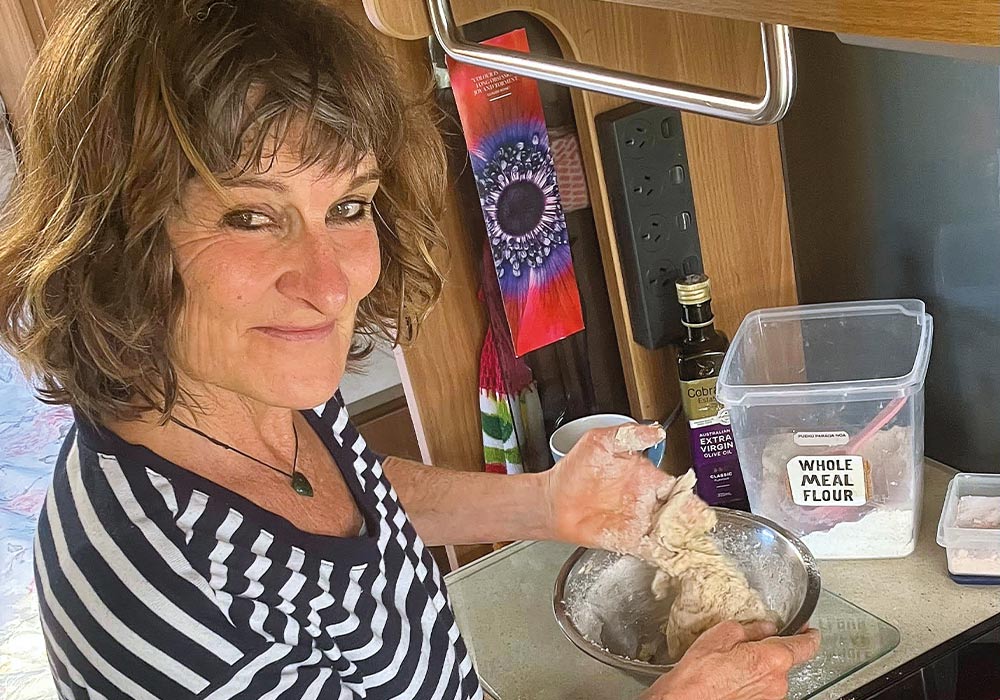
Julja says, “Space is a precious commodity. That said, I don’t skimp on quality. I have a copper fry pan with a heavy base, two different size pots with lids, and four oven-proof mixing bowls. From working in professional kitchens for years, I know the value of a chopping board and knives. I have two boards, two small paring knives, and two long knives (one serrated, one plain). Invest in knives you feel comfortable using. Knives are like shoes. Some fit you, others don’t. Another useful item is a rubber spatula for mixing and blending. I have a whisk, a stick blender, and a coffee/spice grinder. Freshly ground spices taste vastly superior and make or break a simple dish. My motorhome has an oven, so I have two baking trays and a muffin tin. And that’s it.”
Simple recipes for the road
Julja advises to not aim for elaborate dishes in an RV.
“My favourite food is freshly baked bread with a bowl of fragrant soup. I bake my own bread, but it’s available everywhere,” she says.
“Among my basic staples are bulgur wheat, eggs, milk, rolled oats, rice, nuts, honey, and a jar of peanut butter and soya sauce. Any of these create sweet or savoury dishes. I use them as a frame and dress them up with fresh produce, chopped herbs, or grated ginger. I’m vegetarian but if you’re not, you can add any meat.
Tabouleh with a twist
Serves 4
Ingredients
- 1 cup bulgur wheat
- 1 cup carrots sliced finely into rounds
- ½ cup sundried tomatoes, sliced finely
- 6 to 8 large nasturtium leaves, (plus blossoms, if available)
Dressing
- 4 Tbsp olive oil
- 4–5 Tbsp lemon juice
- 2 Tbsp soy sauce
- 2 Tbsp sweet chilli sauce
Method
- Place bulgur wheat in a bowl and cover with two cups of boiling water. Cover and let stand for about 10 to 15 minutes.
- Dressing: Place all ingredients into a jar with a lid. Tighten the lid securely and shake vigorously until well combined.
- Drain any excess water from the bulgur wheat and put it back into the bowl. Add the dressing and stir with a fork. Steam the carrots until just tender, and add with sliced sundried tomatoes, and washed nasturtium leaves sliced into fine ribbons.
Spiced walnuts
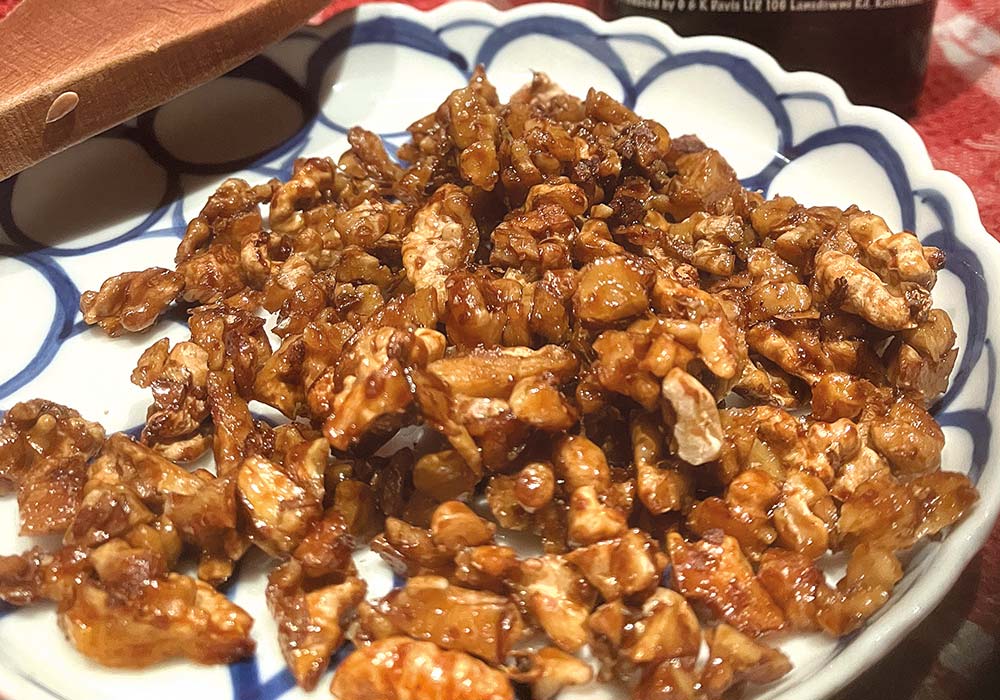
Ingredients
- 1 cup of shelled walnuts shelled
- 1 Tbsp soy sauce
- 1 Tbsp sweet soy sauce (optional)*
- 1 tsp vinegar (apple cider or balsamic vinegar is excellent)
- 1 tsp honey
- Pinch of chilli flakes or ground chilli
- *Use a little more soy sauce and honey if you have no sweet soy sauce
Method
- Chop walnuts roughly. Set aside.
- In a medium bowl, mix all other ingredients using a whisk or fork.
- Dry roast the chopped walnuts in a fry pan (medium heat), stirring frequently, until fragrant (about three to five minutes). Add the dressing and keep stirring. The honey and sweet soy sauce will caramelise the nuts and coat them with a thin spicy layer. Roast the nuts in the frying pan for another minute or two. Spread on a lined or lightly oiled plate. Store in an airtight container. Re-roast if they soften.
Roasted veggie frittata with silverbeet
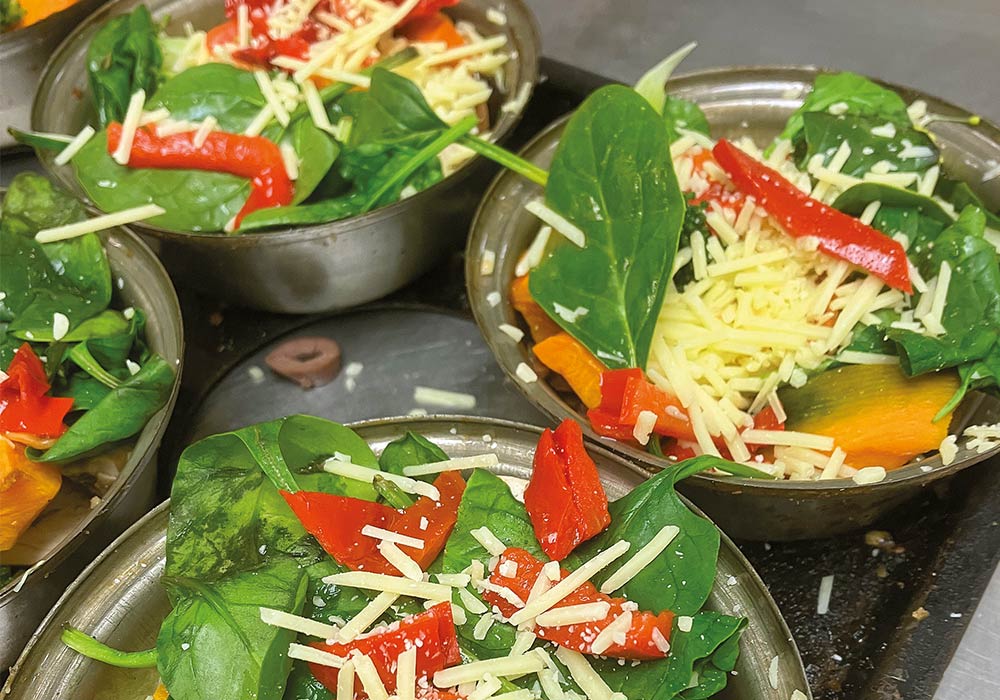
Serves 4
Ingredients
- 1 cup root vegetables chopped
- 1 cup pumpkin chopped
- 10–15cm leek, sliced lengthwise Leave the base on. Substitute the leek with an onion.
- 1 cup sliced mushrooms
- 200g crumbled feta cheese, or 1 cup grated Tasty cheese
- 1½ cups finely chopped silver beet leaves
- 8 eggs
- 1/2 cup cream or milk
- 2 tsp Herbs de Provence or thyme
- 1 tsp salt
- 1tsp black pepper, ground
- Grated Parmesan cheese as topping (optional)
Method
- Place root vegetables, pumpkin, and leek in a ziplock bag, add one to two tablespoons of olive oil, and shake to coat them evenly. Spread onto a lined baking tray and roast until fork tender.
- Slice the mushrooms and silver beet. Steam (or microwave) silver beet until wilted.
- Layer all vegetables and cheese evenly into a greased dish.
- Whisk the five ingredients for the egg mix in a separate bowl and pour evenly over the vegetables. Sprinkle with Parmesan cheese.
- Bake for approximately 40 minutes until just set in the centre. Cool before slicing into wedges.
- Frittata tastes excellent warm or cold. It can be frozen. It will keep in the fridge for three to four days. Add smoked chicken, ham, chorizo, smoked salmon, or sliced bacon, if preferred.
Taylor River walnut cookies (for RVers with an oven)
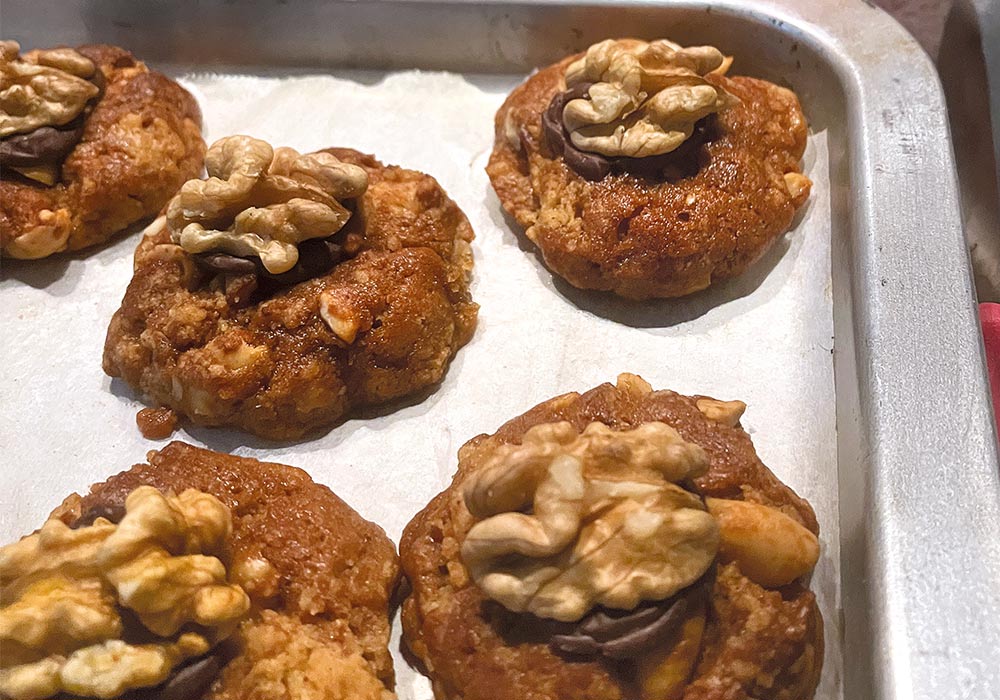
Makes: 24 cookies (approx.)
Ingredients
- 100g soft, salted butter
- 2 rounded tablespoons of nut butter or 2 Tbsp more butter, if you don’t have any
- ¼ cup sugar (white, brown, or demerara)
- 1 Tbsp soft honey
- 2 tsp cinnamon
- 1–1½ cups wholemeal, white or oat flour (less flour results in a chewy cookie, and more results in a cake-like texture)
- 1 tsp baking powder
- 1 cup shelled walnuts, dry roasted and roughly chopped. If no walnuts, replace them with almonds or peanuts. All are best if you roast them yourself.
Method
- Whisk the butter, honey, and sugar to cream. In a separate bowl, mix the dry ingredients, with roasted chopped walnuts.
- With wet hands roll 24 balls and place onto a baking-paper-lined or well-greased baking tray.
- Bake for 10–15 minutes in a medium oven (175–180 degrees).
- Allow the cookies to cool slightly before you handle them.
- Store the leftovers (if there’s such a thing as a leftover cookie) in an airtight container or zip lock bag.
Hint: Walnuts can easily get too dark when you roast them. Choose a large fry pan and a low heat setting, then toast the nuts until fragrant without oil. Small bits of nuts burn more easily, so chop the nuts after toasting.

